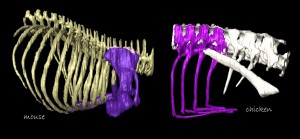NSF, NIH Support Burke’s Development, Evolution Research

Ann Burke, associate professor of biology, recently received a three-year, $395,000 grant from the National Science Foundation (NSF) to study the development and evolution of the shoulder girdle using transgenic mice, frog and salamander.
The mice will be generated in collaboration with a lab at the University of Michigan and will allow Burke and her associates to turn off Hox genes, which are specific patterning genes, in specific sub populations of the embryonic mesoderm that make the musculoskeletal tissues.

“Comparing the dynamics of gene expression and cell interactions during the formation of the pectoral region in a variety of embryos will help us understand the evolution of these musculoskeletal structures and the dramatic variations among vertebrate lineages associated with adaptations for different locomotor strategies, like swimming, scurrying, crawling and flying,” Burke explains.
The frog and salamander experiments will use transplants of mesoderm between wild type embryos and embryos that have Green Fluorescent Protein (GFP) expressed in all their cells, allowing Burke and her associates to fate map mesodermal cell populations.
Fate mapping is determining which cellular structures in the embryo give rise to which adult structures.
“We do this by transplanting the embryonic structure from a labeled embryo (GFP in this case) into the same spot in an unlabeled embryo, and tracing the ‘fate’ of the labeled cells, that is which adult structure they end up in,” Burke says.
Burke also received a two-year $100,000 grant from the National Institutes of Health (NIH) to use the same amphibian systems (salamander and frog) to develop a model system for understanding body wall defects in humans.
The grants will provide funds for a team of researchers at Wesleyan working with Professor Burke on these projects, including a postdoctoral fellow, graduate students and undergraduates.
“Receiving these two new federal grants, plus a grant from the Eppley foundation earlier this year, is a remarkable accomplishment in any year, but particularly this year as funding levels have dropped precipitously,” says Jan Naegele, professor of biology, professor of neuroscience and behavior.

